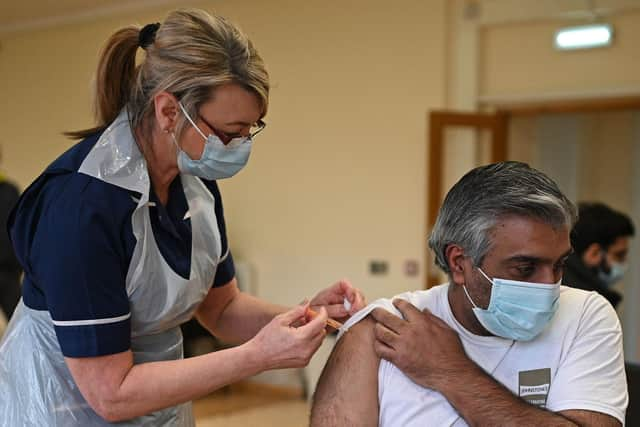Plea to Derbyshire BAME communities to ignore vaccine myths
and live on Freeview channel 276
Figures released by central Government last week confirmed what local officials in Derbyshire had suspected would happen, lower proportions of residents in BAME communities are taking up the Covid vaccines.
The data showed that BAME residents made up 5.7 per cent of all Derbyshire jabs, despite making up 14.45 per cent of the county, including Derby, as of the 2011 census.
Advertisement
Hide AdAdvertisement
Hide AdHealth and social care officials in the county – working together through a joint organisation called Joined Up Care Derbyshire – have been stepping up efforts to urge BAME residents to take up the Covid vaccine when they are offered it.


They are also reassuring BAME residents, who are disproportionately affected by Covid-19, to ignore the disinformation and myths about the safety of the vaccines and to inform themselves with trusted and evidenced research.
Michelle Bateman, who is black Caribbean, is chief nurse for Derbyshire Community Health Services NHS Foundation Trust, which is leading the county and city’s Covid vaccine roll-out.
She told the Local Democracy Reporting Service: “In the black population in particular, there is a view that in years gone by, historically, black people have been put in the line of experiments which makes them reticent about coming forward.
Advertisement
Hide AdAdvertisement
Hide Ad“A lot of what people are saying as well is that they are concerned about the speed at which the vaccine was developed.
“There are concerns about the vaccine components as well and concerns about taking the vaccine during Ramadan.”
Ramadan is the annual Muslim celebration during which celebrants do not eat or drink during daytime for an entire month.
This year Ramadan is from April 12 until May 12.
Ms Bateman added: “We need to understand the root of people’s concerns rather than thinking we know their issues.
Advertisement
Hide AdAdvertisement
Hide Ad“Faith leaders, particularly in the Muslim community, told us that there were concerns about what was in the vaccine, and the British Muslim Council has confirmed that the vaccine would not invalidate their fasting.
“People also talk about the lack of BAME representation in the clinical trials so therefore people aren’t sure if the Covid vaccine is for them.
"It is about giving people an informed choice and not just listening to what you hear in the community.
“The main thing I hear from colleagues is how quickly the vaccination was made, so we are reassuring that the reason it was produced this quickly is because it was a global effort, but it did not mean any corners were cut in terms of the safety of the vaccination.
Advertisement
Hide AdAdvertisement
Hide Ad“In the black community in particularly it is often about mistrust in the health service overall and why we are trying to push the vaccine on that community, that’s how people perceive it, so there is concern and hesitancy.
“There are people in the BAME community who will not need much cajoling to get the vaccine but there are some who will dig their heels in who you will need to try and convince using different methods.
"Covid-19 blew open the box on health inequalities, blew open the box on how people think about health and the NHS in this country and I am hoping that one of the positives that comes out of this appalling situation is that we have started the dialogue.
“We can’t stop that once we have done the vaccinations. We then need to talk about starting to address some of the health inequalities that we have known about for a long, long time but never really managed to get to the crux of and try and influence and change.”
Advertisement
Hide AdAdvertisement
Hide Ad“If you have concerns about the vaccine, talk to your local GP or a health professional who you might know to have these conversations.
“The number of people that have died is horrendous and I know we feel that we are coming to the end of this and can see the light at the end of the tunnel, but we are still a long way off and the vaccine is one important part of the jigsaw.
"If we don’t get as many people getting the vaccinations as possible it is going to affect how we get out of this.”
Delisha-Joy Ruskin, who is British Caribbean, is a community dietician for the University Hospitals of Derby and Burton NHS Foundation Trust.
Advertisement
Hide AdAdvertisement
Hide AdMrs Ruskin, who lives in Chesterfield, said: “I’ve had the vaccine and it is completely safe. It has been through all the rigorous checks that a vaccine would normally have to go through.
"I think it is the quickest and safest way for us to get back to a normal life, to be honest.
“There’s been a lot of disinformation out there, but it is just disinformation and I would tell people to get the vaccine.
“We need to look at the facts, that it (the virus) is particularly harmful to the BAME community and the vaccine is one of the best ways to protect yourself, and your family as well.
Advertisement
Hide AdAdvertisement
Hide Ad“There are certain parts of the community who are quite hesitant because we have never been in a global pandemic, there is hesitancy when we have not known about the virus until a short while ago.
“We need to put people’s fears to bed. I do think if people see people who look like them who have had the vaccine then that will go a long way to helping them feel more confident about taking the vaccine when it is offered to them.
“Don’t just listen to a video on social media just because it says ‘doctor’ before someone’s name.
“Always stick to the NHS and Government-endorsed website.”